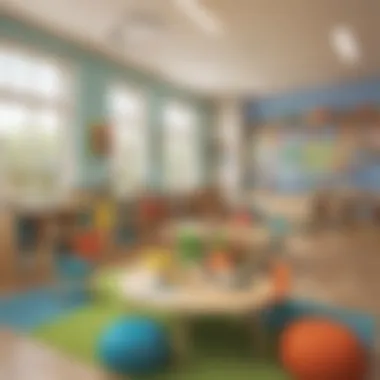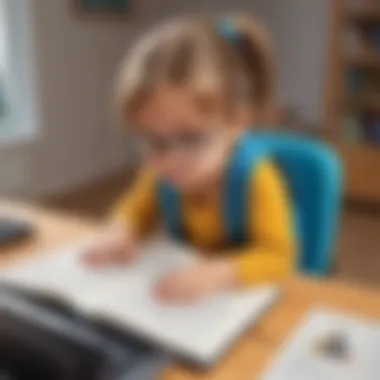Decoding Activities for Kindergarten Literacy Skills


Intro
Early literacy skills form the foundation for successful reading and writing. For kindergarten-aged children, developing these skills is vital. Engaging in decoding activities can make learning enjoyable and effective. This article aims to explore various decoding activities suitable for young learners. Each aspect focuses on enhancing literacy while fostering a love for reading. This guide will assist parents, teachers, and caregivers in implementing these strategies effectively.
Interactive Learning Games
Interactive learning games offer a fun and engaging way for children to develop decoding skills. These games encourage active participation and promote cognitive development while reinforcing literacy concepts.
Popular Games
Several games stand out for their effectiveness in teaching decoding skills. Examples include:
- Starfall: A digital platform that promotes reading through animations and games.
- ABCmouse: A comprehensive curriculum focuses on reading and includes diverse activities.
- Endless Alphabet: This app introduces vocabulary through fun animations and engaging interactions.
Description of Top Educational Games
Each game has unique features that cater to varying learning styles. Starfall offers phonics development, while ABCmouse presents a holistic approach through various subjects. Endless Alphabet focuses specifically on vocabulary development, helping children expand their word recognition.
Benefits of Playing Educational Games for Kids' Cognitive Development
Engaging in these games enhances critical thinking and problem-solving. They can develop memory skills and spatial awareness. Moreover, these games often utilize colorful graphics and sounds to maintain interest, making learning a more enjoyable experience.
Game Reviews
In-depth reviews of selected educational games show significant benefits for young learners. Generally, the feedback from parents and educators is quite positive. For example, Starfall has received praise for its interactive storytelling methods.
Comparison of Gameplay and Learning Outcomes
The comparison shows that while all games aim to teach reading skills, the learning outcomes can differ. For instance, ABCmouse provides broader educational support, addressing skills across various subjects beyond just literacy. Meanwhile, games like Endless Alphabet focus more narrowly on vocabulary acquisition.
Tips and Tricks
Practical tips for parents and educators play a critical role in enhancing children's learning journeys. Here are a few strategies to make learning engaging and effective:
- Integrate Learning into Daily Routines: Encourage reading during snack time or before bed.
- Utilize Positive Reinforcement: Celebrate small achievements to boost motivation.
- Promote Parent-Child Interaction: Engage in reading together to foster connection and learning.
Creative DIY Projects
Hands-on activities nurture creativity while reinforcing literacy skills. Children find joy in creating tangible products, linking learning to real-world applications.
Step-by-Step Guides
Providing detailed instructions for engaging DIY projects can spark children's imaginations. For example, making a simple storybook using art supplies promotes narrative skills alongside reading enjoyment.
Craft Ideas
Using simple household items for crafts can stimulate creative expression. For example, crafting letters from cardboard or making a word collage promotes letter recognition and spelling skills. The importance of artistic expression in children's development cannot be understated. It allows them to communicate their interpretations of the world.
"Children are made readers on the laps of their parents."
- Emphasis on family involvement is crucial in nurturing literacy.
Children who engage in literacy activities within supportive environments show stronger reading and comprehension skills. By integrating decoding activities into playful formats, we take a step forward in fostering young learners' reading abilities.
Prelude to Decoding in Early Literacy
Understanding decoding in early literacy is crucial in shaping a child's educational journey. Decoding is the ability to convert printed words into spoken language, serving as a foundational skill for reading. In kindergarten, where children are first exposed to literacy concepts, the focus on decoding cannot be overstated. Early exposure to decoding activities not only enhances a child's reading abilities but also their overall confidence in literacy tasks.
Decoding establishes a bridge between spoken and written language. As children engage in various decoding activities, they develop their phonemic awareness, which is the ability to identify and manipulate individual sounds in words. This skill is essential, as it lays the groundwork for reading fluency and comprehension in later academic years.
Moreover, incorporating decoding activities in the classroom provides numerous benefits for young learners. The repetitive nature of these activities promotes familiarity with letters and sounds, which can lead to increased retention. Children become more proficient in recognizing patterns in words, assisting them as they progress in their reading journey.
Ultimately, understanding decoding in early literacy is not just about teaching children how to read. It is about fostering a love for learning. When kindergarten-aged kids successfully decode words, they gain a sense of achievement that encourages them to explore new stories and texts. This positive feedback loop is essential for instilling a lifelong appreciation for reading. Therefore, focusing on decoding activities in this pivotal stage is vital for laying a solid foundation for future academic success.
Importance of Decoding Skills in Kindergarten
Decoding skills serve as a cornerstone for literacy development in kindergarten. This early stage of education is crucial because children begin to make connections between sounds and the written word. Effective decoding allows children to recognize and interpret the letters and sounds that form words. This process not only aids in reading but also enhances overall communication abilities. By prioritizing decoding skills, educators and parents lay down strong foundations for proficient literacy.


Foundational Literacy Development
Developing decoding skills in kindergarten is essential for foundational literacy growth. At this stage, children encounter letters, phonemes, and basic word structures for the first time. By engaging in decoding activities, they learn to break down words into manageable parts. This understanding is vital for recognizing both familiar and unfamiliar words. For instance, activities such as phonemic awareness exercises equip children with the ability to distinguish sounds within words, facilitating smoother reading experiences in the future.
Children can benefit significantly from various strategies designed specifically for kindergarten learners:
- Phonemic awareness games help them identify and manipulate individual sounds.
- Word building activities provide hands-on engagement with letters and sounds.
- Sight word recognition allows them to recognize high-frequency words quickly.
All these elements contribute significantly to a child's ability to read fluently, laying the groundwork for continued learning and literacy skills.
Impact on Future Academic Success
The importance of decoding skills extends beyond early reading. Strong decoding abilities correlate with better overall academic performance. As children transition into higher grades, their reading comprehension becomes pivotal. Weak decoding skills can lead to challenges in understanding complex texts, which are essential in academic settings. Thus, investing time in developing these skills during kindergarten can yield long-term educational benefits.
Several studies indicate that students with a strong grasp of decoding in early education typically excel in future literacy assessments and other academic areas. They are more inclined to engage with texts, participate in discussions about reading material, and tackle advanced learning tasks. It is essential to emphasize that early decoding activities not only promote literacy but also enhance critical thinking and problem-solving skills, nurturing well-rounded students.
"Decoding is the first step toward effective reading, and its importance in later educational endeavors cannot be overstated."
Types of Decoding Activities
Engaging kindergarten children in various decoding activities is essential for their literacy development. These activities can enhance children's ability to understand and use language effectively. It is vital to combine play and learning so that kids develop a love for reading. Moreover, integrating varied activities keeps the experience exciting and fosters sustained attention. Effective decoding activities support young learners in recognizing sounds, words, and sentences, laying a strong foundation for their reading skills.
Phonemic Awareness Exercises
Phonemic awareness is the ability to hear, identify, and manipulate the individual sounds in spoken words. This skill is fundamental for beginning readers and can be developed through simple exercises. Activities like sound matching help children practice identifying similar sounds or phonemes. For instance, a teacher can say a sound and ask students to find pictures that correspond to that sound. Sound segmentation games are also valuable. Here, children clap their hands for each sound they hear in a word. Such exercises promote not only recognition but also pronunciation skills.
Word Building Activities
Word building activities engage children in creating words using letter tiles or magnetic letters. This hands-on approach facilitates a deeper understanding of spelling patterns and phonics. When children construct words, they learn about blends, digraphs, and other letter combinations. Additionally, these activities can be adapted for different skill levels, allowing educators to tailor experiences based on each child's need. It is essential to encourage children to read the words they create, ensuring they associate the sounds with the letters.
Rhyming Games
Rhyming games are an effective method to enhance children's listening and language skills. Rhymes require children to recognize similarities in sounds, a crucial step toward developing phonemic awareness. Activities such as "Rhyme Time" involve reciting a verse and inviting kids to provide words that rhyme. Another interactive approach is finding and matching rhyming pairs from a set of cards. This not only promotes decoding but also expands their vocabulary. Furthermore, rhyming enhances memory and predictive skills in reading.
Sight Word Recognition
Sight word recognition refers to the ability to recognize words instantly without having to sound them out. Familiarity with the most commonly used words in English allows children to read more fluently. Activities for enhancing sight word recognition include flashcards and word walls. A fun and engaging approach is to incorporate sight words into games, such as bingo. Using repetition in different contexts increases children’s exposure, which is essential for retention. As a result, children build confidence in their reading abilities.
Effective use of decoding activities can transform a child's reading journey, making it both enjoyable and fruitful.
Integration of Decoding Activities into Curriculum
Integrating decoding activities into the curriculum is essential for developing early literacy skills in kindergarten-aged children. It ensures that students are not only exposed to reading but are also engaged in understanding how words are constructed and pronounced. This integration fosters a holistic learning environment, where decoding becomes a foundational skill that supports further academic achievements.
The benefits of incorporating decoding activities are manifold. First, they provide students with the tools necessary to become proficient readers. When children learn to decode, they gain confidence, which often translates to a greater willingness to explore reading material independently. Additionally, it enhances their comprehension skills, as students are better equipped to tackle unfamiliar words. Furthermore, integrating these activities into the daily curriculum promotes consistency, allowing children to practice their skills repeatedly and improve over time.
When considering the integration of decoding activities, it is crucial to align them with educational standards. This alignment ensures that the activities meet the learning goals established by educational authorities. The activities carried out should not be arbitrary but structured to support specific literacy outcomes, such as phonemic awareness, vocabulary development, and fluency. It promotes accountability in teaching and assures that educators are effectively contributing to the students’ overall literacy development.
"Integrating decoding in a systematic manner not only helps children to read but also cultivates a lifelong love for literature."
Aligning Activities with Educational Standards
Aligning decoding activities with educational standards is a pivotal aspect of an effective literacy curriculum. Educational standards provide a benchmark against which student progress can be gauged. For educators, this means designing activities that not only engage students but also fulfill prescribed learning objectives.
By ensuring that decoding activities correspond with these standards, educators can track students’ progress and identify areas that may require additional focus. This practice helps to foster a cohesive learning experience across different educational settings. Moreover, it assists in bridging gaps for students who may struggle, allowing them to receive targeted support.
Additionally, aligning with educational standards can prepare students for assessments and evaluations they will encounter as they progress in their academic careers. Activities such as phonics games, interactive reading sessions, and word-building exercises need to be purposeful and directly reflect the skills outlined in the educational framework.
Creating a Balanced Learning Environment
A balanced learning environment is vital for effective literacy education, especially in the context of decoding skills. This balance can be established through a combination of various teaching approaches and material resources aimed at catering to diverse learning styles and preferences among students.
In practice, a balanced learning environment includes a mix of visual, auditory, and kinesthetic learning experiences. For instance, incorporating auditory activities such as songs that emphasize rhyming can complement visual exercises like picture-word associations. This variety not only keeps young learners engaged but also enables them to make connections between different forms of information.
Moreover, supporting students in understanding letter sounds through interactive games encourages a more profound mastery of decoding skills. Encouraging collaboration and peer interaction also contributes to an enriching atmosphere. Children learn from each other and develop their skills in a supportive community. Thus, structuring a curriculum that prioritizes a balanced approach can help expectations regarding literacy be met effectively, resulting in a more dynamic and effective learning experience.
Tools and Materials for Decoding Activities


The success of decoding activities in kindergarten heavily relies on the appropriate tools and materials. These resources are not merely supplementary; they form the backbone of effective literacy instruction. Selection of the right materials can significantly enhance engagement, facilitate practice, and support diverse learning needs.
When educators and parents understand the types of tools available, they can tailor activities to better suit children's interests and abilities. Proper tools encourage students to explore phonics and reading through dynamic means. Good resources not only increase children's enthusiasm but also improve their decoding skills by enabling hands-on learning experiences.
Digital Resources and Apps
Digital resources and applications are becoming increasingly popular in early literacy education. These tools offer interactive and engaging environments that can captivate young learners. Many apps are designed to foster phonemic awareness and word recognition through games and challenges.
Benefits of digital applications include:
- Immediate feedback: Many apps provide instant responses to a child’s actions, allowing for quick corrections and reinforcement of learning.
- Customizable experiences: Programs like Starfall or ABCmouse offer personalized learning paths based on a child's strengths or areas needing improvement.
- Variety in learning: A wide array of games and activities keeps children engaged, as they can choose from different themes and subjects.
When selecting apps, it's crucial to ensure they align with educational standards and remain suitable for the target age group. Parents and educators should also consider screen time limits to balance digital engagement with other forms of learning.
Printable Worksheets and Games
Printable worksheets and games provide another essential tool for decoding activities. These resources are valuable for facilitating tactile learning experiences. Through worksheets, children can practice phonics, syllable segmentation, and sight word recognition.
Worksheets can incorporate various activities, such as:
- Matching games: Helping children associate words with images reinforces vocabulary.
- Crossword puzzles and word searches: These formats make learning playful and encourage word exploration.
- Coloring activities: Combining art with learning allows for enjoyable interaction with letters and sounds.
It is important to consider the layout and instructions of worksheets. Clear and engaging designs can maintain a child's focus. Moreover, printable resources allow for repeated practice, which is vital for skill retention.
The integration of diverse tools and materials enhances the educational landscape for kindergarten literacy, providing a pathway for effective decoding instruction.
Strategies for Effective Implementation
Implementing effective strategies for decoding activities in kindergarten is crucial for facilitating early literacy development. The right strategies can enhance children's engagement with reading, support diverse learning styles, and ensure that all students have the opportunity to thrive as they develop decoding skills. When educators incorporate these strategies effectively, they address the specific needs of their learners while fostering a love for reading.
Differentiating Instruction for Diverse Learners
Differentiation is the cornerstone of effective teaching, especially in a diverse classroom. Kindergarteners often present a wide range of abilities, backgrounds, and learning styles. Tailoring instruction to fit these individual needs can significantly improve learning outcomes.
To achieve this, teachers may start by assessing each child's current decoding abilities. This can be done through informal observations or simple phonemic awareness assessments. Based on these findings, activities can be grouped into varying levels of difficulty. For instance, while some children may benefit from basic sound-letter correspondence drills, others might excel with word-building exercises that challenge them to create and blend different phonemes.
Key considerations for differentiation include:
- Flexible Grouping: Use small groups to foster collaboration among peers with similar skills while providing targeted instruction.
- Varied Materials: Include a mixture of digital resources, textbooks, and hands-on materials to cater to different learning preferences.
- Ongoing Adjustments: Monitor progress regularly and be prepared to adjust instruction based on learners' responses and achievements.
"Effective differentiation acknowledges that learners are unique and deserve tailored instruction to meet their needs."
Using Feedback to Enhance Learning
Feedback is a valuable tool in the learning process. When used effectively, it can significantly enhance students' decoding skills and overall literacy growth. Constructive feedback lets children know where they are doing well and areas that may need improvement.
When providing feedback, it is essential to focus on specific aspects of a child's performance. For example, rather than saying, "Good job!" it is more effective to point out what they did well, such as, "I noticed you used your sound skills to blend those letters together." This specificity reinforces positive behaviors and illustrates what successful decoding looks like.
Incorporating feedback in the classroom involves:
- Immediate Response: Provide feedback shortly after the activity, helping students connect their actions to the assessment.
- Encouragement and Constructive Critiques: Balance positive reinforcement with guidance on how to improve. This motivates learners and gives them a clear direction.
- Peer Feedback Opportunities: Facilitate peer review sessions where students can share their decoding strategies, further enhancing cooperative learning.
Overall, careful implementation of these strategies can empower kindergarteners to excel in decoding, setting a strong foundation for their reading journey.
Engaging Parents in Decoding Activities
Engaging parents in decoding activities is essential for reinforcing children's literacy skills at home. When parents take an active role, they help create a supportive learning environment that extends beyond the classroom. Encouraging this involvement can significantly impact a child's reading development, leading to improved confidence and competence. Researchers consistently find that collaboration between schools and families is linked to better learning outcomes. Thus, fostering a partnership between educators and parents is crucial in literacy education.
By communicating effectively with parents, teachers can strive to build a bridge that improves the shared language of learning. The integration of decoding activities into home routines makes it more likely that children will practice their skills outside of school hours. When children see their parents engaged in the learning process, they are likely to mirror that enthusiasm. This not only promotes literacy but also strengthens the child-parent relationship.
Communication Strategies
Effective communication strategies are vital to engage parents in decoding activities. Here are some methods to encourage participation:
- Regular Updates: Send out newsletters or messages through platforms like Facebook to inform parents about classroom activities and decoding exercises. Keeping them in the loop will motivate them to participate.
- Workshops: Organize parent workshops to teach them about decoding and how to assist their children. When parents know what to do, they feel more confident and involved.
- Regular Feedback: Provide parents with updates on their child's progress. This can encourage them to continue supporting their child’s learning at home.
Using these strategies will help create a partnership between home and school that benefits the child’s literacy development.


Home-Based Learning Approaches
Home-based learning approaches can further enhance children’s decoding skills. Simple activities can turn the home environment into a literacy-rich space. Here are some ideas parents can easily implement:
- Reading Together: Set aside time for parents and children to read books together. This interaction builds comprehension while fostering a love for reading.
- Decoding Games: Use fun games like Scrabble or letter tiles to promote decoding. Playing games makes learning enjoyable and less intimidating for children.
- Daily Practices: Incorporate short decoding exercises into daily routines, such as identifying letters and sounds during cooking or shopping activities.
“Children's literacy skills are greatly enhanced when parents are engaged in their learning journey.”
These approaches create opportunities for continued learning outside the traditional classroom, allowing parents to actively support their child’s literacy development.
Assessing Decoding Skills Progress
Assessing decoding skills in kindergarten is an essential component of early literacy education. It helps educators and parents to understand how well children are grasping the fundamental skills needed for reading. This understanding forms the backbone of effective teaching practices. It allows for targeted interventions that cater to individual learning needs. Regular assessment can identify children who may need additional support, while also tracking progress over time. The methods used for assessment can impact a child's confidence and motivation in learning, making it a critical area to focus on.
Observation and Informal Assessment Techniques
Observation plays a vital role in assessing decoding skills. When educators observe children during reading activities, they can gain insights into the decoding strategies children use. This method involves watching how students interact with texts, including their ability to recognize sight words and apply phonetic skills.
Informal assessments can include:
- Listening to students read aloud to identify errors and self-correction patterns.
- Engaging in discussions to gauge comprehension levels.
- Using checklists to note specific decoding strategies observed during reading activities.
These techniques provide valuable qualitative data about a child's reading abilities. They can reveal a lot about a child's thought process and learning style. Furthermore, they allow flexibility in assessing children with different learning needs. Teachers can adjust their approaches based on these observations, ensuring that every child receives the support required for growth.
Standardized Testing in Early Literacy
Standardized testing holds significance in assessing decoding skills as well. While it is often more structured, it serves a purpose in evaluating how individual children compare to established benchmarks. These tests can be helpful for larger-scale assessments, providing data that can inform educational strategies at a broader level.
However, it is crucial to approach standardized testing with caution. It should not be the sole measure of a child's reading abilities. Here are a few key considerations:
- Context matters: Children's performance may vary based on their emotional and physical state on test day.
- Cultural factors: Some tests may not fully account for diverse learning backgrounds.
- Developmental readiness: Kindergarteners may not be developmentally ready for certain test formats, affecting their performance.
To balance informal assessments with standardized testing could offer a more comprehensive view of a child's decoding skills. Striking this balance can lead to more informed educational decisions and help foster a positive learning environment.
"A well-rounded approach to assessing decoding skills can create more meaningful learning experiences for children, encouraging both growth and a love for reading."
Challenges in Teaching Decoding Skills
Teaching decoding skills to kindergarten-aged children presents unique challenges that educators and parents must navigate. Recognizing these challenges is essential for fostering effective learning environments. It allows educators to develop targeted strategies and interventions for each child. Understanding these obstacles plays a critical role in shaping literacy skills that are fundamental for a child’s academic journey.
Identifying Learning Difficulties
One of the first steps in addressing decoding challenges is identifying specific learning difficulties. Children process information differently. Some may struggle with phonemic awareness, while others have difficulty with letter-sound correspondence. Teachers should conduct regular assessments to pinpoint these issues. Observations during reading activities can also provide valuable insights into a child's decoding capabilities.
Early identification of learning difficulties is vital. It allows for timely intervention. For example, if a child has trouble segmenting sounds, targeted phonemic exercises may be necessary. Parents can also assist by being attuned to their child’s struggles with words at home. By maintaining open communication with educators, they can collaboratively work on solutions.
Overcoming Resistance to Learning
Resistance to learning is another significant barrier in teaching decoding skills. Some children may exhibit a lack of interest in reading activities. This resistance could stem from frustration or past negative experiences. Educators should focus on creating a positive and engaging learning environment.
To combat resistance, varied teaching strategies can be employed. For example, integrating multi-sensory activities can capture a child's attention. Utilizing games, music, and interactive technologies can make decoding more appealing. Additionally, providing choices allows students to feel more in control of their learning.
Support from parents plays a crucial role in overcoming resistance as well. Encouraging a routine that includes reading at home fosters a culture of literacy. Engaging in fun reading activities or storytelling can spark interest. Moreover, setting achievable goals encourages a sense of accomplishment in children, reducing their resistance to learning.
The journey of decoding is not just about reading; it is about cultivating a love for literacy that will support lifelong learning.
By addressing these challenges, educators and parents can significantly enhance the decoding skills of kindergarten children. It is a fundamental step in promoting early literacy, ensuring a better foundation for future academic success.
Finale: The Path Forward in Decoding Education
The conclusion of this article is essential as it encapsulates the journey taken through the various discussions around decoding activities. This section really ties together the significance of nurturing literacy skills at an early age. A strong emphasis on decoding can lead to enhanced reading competencies in young learners. By focusing on methods and strategies, we can cultivate an environment conducive to learning.
Emphasizing Lifelong Learning
Fostering a culture of lifelong learning begins with the very young. The decoding skills developed in kindergarten serve as the foundation for future educational endeavors. It is crucial for educators and parents to instill a love for learning that continues beyond the classroom. Activities designed to enhance decoding not only support academic growth but also encourage curiosity and resilience. Young children who engage in decoding exercises often find pleasure in reading, which can last into adulthood. Lifelong learning is about creating learners who seek knowledge independently, and this trajectory starts early with effective decoding practices.
Encouraging a Culture of Reading
Creating a culture of reading in young children's lives is vital for developing strong literacy skills. When children see reading as enjoyable and worthwhile, they are more likely to engage with texts outside of formal education. This can be supported by integrating decoding activities into everyday routines. Parents can take part in reading sessions, storytelling, and even involve children in selecting books. Utilizing resources such as local libraries or community programs can also enhance this culture. Encouraging children to view reading as an adventure empowers them to actively participate in their learning journey, laying the groundwork for lifelong literacy.
When children learn to decode at a young age, they unlock a world of opportunities that accompany strong literacy skills.
In summary, nurturing decoding skills during kindergarten can create a strong basis for both academic and personal development in speaking, writing, and most importantly, reading. This emphasis on early literacy has lasting benefits not only for individual children but also for society as a whole.















